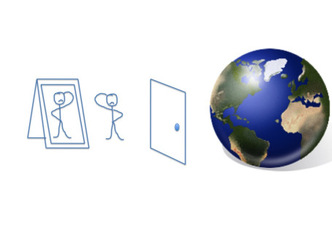
You might have known this for years, but I have just had a major revelation! I feel kind of foolish because I have known this at a head level for a long time but it is only now that I am beginning to really understand it at a heart and gut level.
Here is what my revelation is:
Sorting myself out is not about “sorting myself out” at all, but about accepting myself as I am, flaws and all, and stepping out into the world boldly, but otherwise completely unchanged!
Over the last few weeks I have felt the desire to retreat into my burrow and have a good look at myself, sort out my issues, clear any blocks that might be holding me back from achieving that which I set out to achieve. It has been a really good process. I felt, and still feel, as though I have made a few important breakthroughs.
Today, I let myself out in public and I got involved in a conversation that challenged my new view of the world and I could feel a level of anxiety creep up in me and I thought to myself, I am not ready yet, there is more work to be done!
So I retreated back and took myself off for a walk by the sea and a bit of meditation. A routine always sure to ground me and calm the incessant thoughts that spin around in my head. And there it came to me, an image of myself keeping the world locked outside my door while I tried to “sort myself out”! What a futile exercise!
Firstly, I cannot “sort myself out” in a vacuum. I can reach all the amazing conclusions I want but if they fall apart the minute I step into relationship with other people, they are meaningless. So I have to do at least some of my “sorting out” in public, live, “on-the-fly” so to speak. I have to take risks, experiment, fail and try again. This, in the past, has gone completely against the grain for me.
Secondly, if I cannot sort myself out in a vacuum, it means I have to be willing to take myself, as I am – warts and all, out into the world and start acting from this place of imperfection and flaws whilst fully acknowledging the “less than ideal” state that I am in. This thought suddenly makes me feel light, like a burden has been lifted. It means I am going to give up the notion of waiting until I am ready or “good enough” to take bold steps and accept that I can make the brave moves right now, as I am. I am now longer going to waste my energy making war with myself and my flaws (a lovely phrase I picked up from reading the Walks with Yogi blog (http://walkswithyogi.wordpress.com/tag/carl-jung/), but rather carry them with me as an essential part of who I am. This gives me so much more energy to get on with the joyful business of living. I now finally get what Carl Jung meant when he said “I’d rather be whole than good”.
Finally, I am reminded of Anold Beisser’s Paradoxical Theory of Change – another piece of wisdom that I fully sign up to but have to be reminded of at a deep core level every now and then.
Beisser states that… “that change occurs when one becomes what he is, not when he tries to become what he is not. Change does not take place through a coercive attempt by the individual or by another person to change him, but it does take place if one takes the time and effort to be what he is — to be fully invested in his current positions.”
When I am only what I am, and fully what I am, I have the power and the energy to take on the world and win. I cannot do it by trying to be someone or something else at the same time.
My ambition now is to be ME to the fullest extent of what that means. I know that the times in the past when I have achieved this is when I have done my best, most meaningful work. It is when I am truly at my most powerful.
Have you found the path to being YOU in all your beautiful and ugly glory?







 RSS Feed
RSS Feed